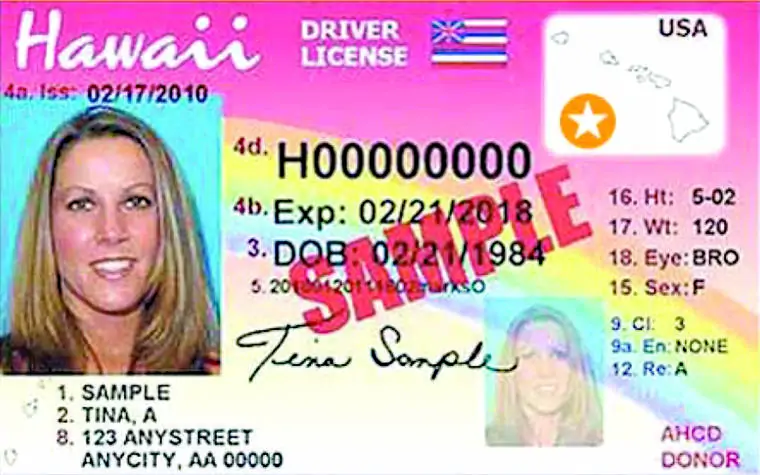Hawaii
ID Scanning Laws
A business may scan a Hawaii identification card or driver’s license only under specific circumstances:
- Verifying the authenticity of IDs or the identity of the individual, if the individual pays for goods or services with a method other than cash, returns an item, or requests a refund or an exchange.
- Verifying the individual’s age when providing age-restricted goods or services.
- Preventing fraud or other criminal activity, if the individual returns an item or requests a refund or an exchange and the business uses a fraud prevention service company or system.
- Establishing or maintaining a contractual relationship.
- As required by state or federal law.
- Transmitting information to a consumer reporting agency, financial institution, or debt collector as permitted by the federal Fair Credit Reporting Act, Gramm-Leach-Bliley Act, or Fair Debt Collection Practices Act.
- Recording, retaining, or transmitting by a covered entity subject to the medical privacy and security rules under the Health Insurance Portability and Accountability Act of 1996 (HIPAA).




Hawaii State Legislature
ID Scanning Resources
The Legal Framework
Hawaii ID Scanning Laws and Regulations
In Hawaii, it is legal for businesses, including hotels, to scan IDs and collect data from driver’s licenses and ID cards for defined purposes. This practice is regulated by a law passed on June 28, 2012, known as Chapter 487J of the Hawaii Revised Statutes. The law was enacted to protect privacy by limiting the circumstances under which private businesses can scan IDs and retain the scanned data.
In the hospitality industry, verifying the identity of guests is a crucial aspect of operations. In Hawaii, this often involves scanning identification cards (IDs) or driver’s licenses. However, the practice of ID scanning is regulated by specific laws to protect individuals’ privacy and prevent misuse of personal information.
Overview of Hawaii ID Scanning Laws
Hawaii has enacted a statute to regulate businesses’ practices of scanning IDs and retaining and selling information obtained through scanning IDs. According to Hawaii Statute [§487J-6], a business may scan a Hawaii identification card or driver’s license only under specific circumstances:
- Verifying the authenticity of IDs or the identity of the individual, if the individual pays for goods or services with a method other than cash, returns an item, or requests a refund or an exchange.
- Verifying the individual’s age when providing age-restricted goods or services.
- Preventing fraud or other criminal activity, if the individual returns an item or requests a refund or an exchange and the business uses a fraud prevention service company or system.
- Establishing or maintaining a contractual relationship.
- As required by state or federal law.
- Transmitting information to a consumer reporting agency, financial institution, or debt collector as permitted by the federal Fair Credit Reporting Act, Gramm-Leach-Bliley Act, or Fair Debt Collection Practices Act.
- Recording, retaining, or transmitting by a covered entity subject to the medical privacy and security rules under the Health Insurance Portability and Accountability Act of 1996 (HIPAA).
Information collected under points 3 and 4 must be limited to the individual’s name, address, date of birth, and driver’s license number or identification card number.
Retention and Sale of Data From An ID Scan in Hawaii
The information collected can be retained only as permitted in points 3 through 7 of the statute. Similarly, the information collected can be sold or disseminated only as permitted in points 3 through 7. Any waiver of any of the provisions of this statute is specifically prohibited.
ID Scanning in Hotels: Practical Applications
Loyalty Enrollment Using ID Scanning in Hawaii
Under the statute, a hotel is likely allowed to scan the ID of a guest enrolling in the hotel’s loyalty program under point 4, as long as the information collected and retained is limited to the name, address, date of birth, and ID number.
Credit Applications Using ID Scanning in Hawaii
Under the statute, a hotel is likely allowed to scan the ID of a guest applying for a (private label) credit card under points 4 and 6.
ID Scanning for Customer Pickup in Hawaii
A hotel is not likely allowed to scan the ID of a guest wishing to pick up purchased merchandise for the sole purpose of verifying the identity of the guest. As currently in effect, the statute allows a business to scan a guest’s ID to verify the identity of the guest if the guest pays with a method other than cash, returns an item, or requests a refund or an exchange. The “fraud or other criminal activity” exception applies when the guest is returning an item or requesting a refund or an exchange. Under the current version of the statute, the hotel may have to limit its options to visually inspecting the ID without scanning it.
Please note that this information is intended to provide a general overview and does not constitute legal advice. Always consult with a legal professional for advice specific to your situation
Hawaii Anti-Trafficking Network
Our Fight Against Human Trafficking



Knowledge Base
Frequently Asked Questions
Yes, a hotel in Hawaii can scan a guest's ID under specific circumstances, such as verifying the authenticity of the ID, verifying the individual's age, preventing fraud, establishing or maintaining a contractual relationship, or as required by state or federal law.
A hotel can use the information obtained from scanning a guest's ID to verify the guest's identity, age, and payment method, prevent fraud, establish or maintain a contractual relationship, or comply with state or federal law. The hotel can also transmit the information to a consumer reporting agency, financial institution, or debt collector as permitted by federal law.
Yes, a hotel can retain the information obtained from scanning a guest's ID, but only as permitted under points 3 through 7 of Hawaii Statute [§487J-6].
A hotel can sell or disseminate the information obtained from scanning a guest's ID only as permitted under points 3 through 7 of Hawaii Statute [§487J-6].
Yes, a hotel is likely allowed to scan a guest's ID for loyalty program enrollment under point 4 of Hawaii Statute [§487J-6], as long as the information collected and retained is limited to the name, address, date of birth, and ID number.
Yes, a hotel is likely allowed to scan a guest's ID for a credit card application under points 4 and 6 of Hawaii Statute [§487J-6].
